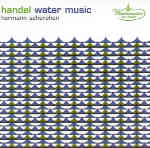Hermann Scherchen was unique among conductors of his generation (he was born in 1891) for being a triple-threat. His conducting of standard repertoire often was boldly imaginative, he championed the avant-garde, and he extensively explored neglected corners of the past, including the Baroque. It’s startling how fresh his Baroque interpretations still sound, especially when compared with contemporaries such as Furtwängler (five years his elder) or even Karajan (17 years his junior). Scherchen, with all his idiosyncracies, never was guilty of the glutinous textures and ponderous tempos that characterized those conductors’ anachronistic approach to music of that period. Nor did he indulge in the excesses and spurious theorizing practiced by some of today’s “historically informed” performers. Scherchen’s performances were geared to modern instruments and performing conditions; his “middle way” is still a happy alternative. So these 1960 recordings of Handel, Vivaldi, and Torelli should afford considerable pleasure and minimal stylistic discomfort.
Handel’s familiar Water Music requires larger forces and Scherchen’s discreet version is a model of rectitude alongside the Edwardian pomp of the abbreviated Suite recorded the following year by Stokowski with a huge orchestra, doubled instrumentation, and added percussion. Most performing versions of the work stick to one or more of its three suites; Scherchen mixes and matches to make a continuous 22-movement, 48-minute piece. The opening Overture is appropriately weighty, a bit slow to our contemporary ears but marvelously sustained before giving way to some deliciously graceful wind solos and up-tempo sprightliness. Scherchen being Scherchen, there are some fetching individual touches such as the soulful, lovingly phrased violin and wind solos of the fourth-movement Andante, the gently dancing winds of the first Hornpipe, and surprising hints of spiky Prokofiev in the brief No. 21. We’re a long way from the overstuffed Harty arrangements that were standard issue when this recording was made.
Scherchen’s Westminster recordings usually enjoyed good sound and while this one could have more impact, it’s more than acceptable. The orchestra identified as the Vienna State Opera Orchestra actually is the orchestra of the Volksoper, Vienna’s other opera house. The playing is adequate, but the all-important horns have the broad, typically Viennese sound that substitutes warmth for the more appropriate bite. A harpsichord occasionally tinkles somewhere deep in the background. The fillers are welcome too and enjoy more vivid sonics. The Torelli puts trumpeter Roger Delmotte through his paces and sounds as if it were written for early morning airplay on a late-17th century Bologna radio station. More substantial are the two-trumpet concertos of Vivaldi and Handel, both of which get nicely scaled, snappy performances with a reduced orchestra.
































